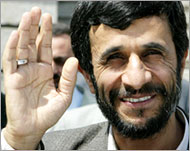Iran again delays nuclear work restart
Iran has postponed the resumption of its nuclear activities but still rejects Western appeals to keep the project frozen, saying it hoped to restart work at a uranium conversion plant by early next week.

Tehran had said it would resume nuclear work on Wednesday, having earlier postponed the restart from Monday.
The European Union has warned Iran that any resumption of nuclear fuel activities would mean an end to two years of negotiations.
Tehran says it wants only to generate electricity but the West suspects it aims to make nuclear bombs.
If Iran resumes work and the EU declares the talks over, the EU would then back US calls to start a process that could end with the Islamic republic being referred to the UN Security Council for possible sanctions.
Chief nuclear negotiator Hassan Rohani said he had sent a letter to the EU complaining that the bloc was making “unacceptable threats”.
“We hope to restart work by the beginning of next week when preparations are complete,” he told state television, speaking on the day that Iran’s new President Mahmoud Ahmadinejad took office.
West welcomes move
An EU official told reporters in Brussels the new timeframe was a step in the right direction.
|
“We hope to restart work by the beginning of next week when preparations are complete” Hassan Rohani, |
“This is an indication that ties have not been severed and that Iran is interested in learning more about the proposals which the EU3 (Germany, France and the UK) have to make,” he said.
The United States welcomed news Iran had backed away from restarting work.
“If they’ve heeded those calls, that’s a good thing,” said State Department spokesman Tom Casey. “It certainly is a positive thing that the steps that the Iranians had previously suggested they would take have not occurred,” he added.
Iranian policy
Iran’s Rohani said he would probably not remain his country’s top negotiator under Ahmadinejad, but that his successor would not change Iran’s nuclear policies.
Iranian officials have repeatedly said the decision to resume nuclear fuel work was irreversible, but would be carried out under the supervision of International Atomic Energy Agency (IAEA) inspectors.
The IAEA said it would take at least a week to send surveillance equipment from its headquarters in Vienna and install it in the central city of Isfahan, where Iran hopes to convert uranium ore into feed gas for centrifuges.
Centrifuges then enrich uranium by spinning it at supersonic speed.
EU incentives
The EU3 of Britain, France and Germany planned to offer Iran nuclear, political and economic incentives to freeze its nuclear fuel activities indefinitely, and have said a resumption would torpedo two years of hard bargaining and spark an international crisis.
 |
|
It is unclear if Iran’s policy will |
EU foreign policy chief Javier Solana said Ahmadinejad faced “a strategic choice, to continue down a road that leads to isolation, or to decide on and reap the benefit of international cooperation”, according to the pre-publication summary of an article for Germany’s Capital magazine.
Iran insists the EU recognise its right to enrich uranium, something the bloc has refused to do. Iranian officials accuse the EU of breaking a 2004 deal under which Tehran suspended nuclear fuel work, saying the bloc has dragged its heels in the talks started under that agreement.
NPT obligations
Iran, like all signatories of the nuclear Non-proliferation Treaty (NPT), is obliged to open civilian nuclear sites to inspection. Tehran has agreed to allow cameras at its facilities.
The EU3 is holding back a request for a special session of the IAEA board of governors in the hope of a diplomatic solution, an EU official said.
Analysts are split on whether top Iranian policy makers are somehow setting the stage for Ahmadinejad to save the day with a new deal or whether he is subservient to their greater national goals.
EU officials said they still suspected Iran was manoeuvring to put the Europeans on the defensive but would not carry out its threat to restart the conversion of uranium ore into a gas used for nuclear fuel enrichment.